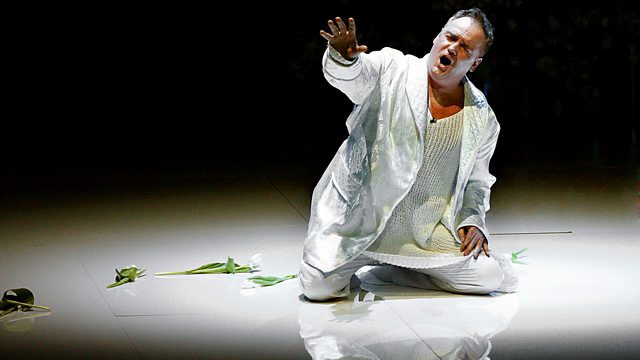
King Roger
Valery Gergiev conducts the Mariinsky Opera in Szymanowki's exotic but rarely-performed philosophical work at the Edinburgh International Festival 2008.
Szymanowski's King Roger is one of the great operatic masterpieces of the 20th century, a musical melting pot of exoticism and exquisite orchestral colours. This rare staged performance given by the Mariinsky Opera conducted by Valery Gergiev was recorded at this year's Edinburgh International Festival. A deeply philosophical work, Szymanowski's music has a sweeping romanticism and exotic lyricism which dramatises the tensions in the composer's own life between aesthetic excess and a rigorous work ethic.
Staged performance sung in Polish directed by Mariusz Trelinski
SYNOPSIS
The opera is set in Sicily in the 12th century
ACT I
A mysterious Shepherd, who ‘teaches and sings strange songs worshipping an unknown God’, has arrived in King Roger’s kingdom. News of this disturbs the peace during a Mass in the cathedral. The King’s dignitaries advise him to imprison the Shepherd as a heretic. Roger’s wife Roxana, however, has perceived the Shepherd’s unique charm and his ‘mysterious smile compared to the ones that the sun sends through the clear waters of the forest lake’. Roger wants to find out more about the Shepherd’s new faith, and though the congregation call for him to be punished, Roger gives him the right to speak out. The Shepherd responds by saying ‘My God is as youthful and beautiful as I am’: his God is a God of joy, lust and pleasure, a God of mercy, unlike the God being worshipped in the cathedral ritual. Roxana gradually falls under the Shepherd’s spell and expresses her ecstatic fascination with him. The Shepherd promises King Roger and his people new freedom; the people continue in their religious observance. Roger calls for silence. He allows the Shepherd to leave but tells him to return that evening for a trial. The congregation is petrified. The Shepherd starts to gain superiority over Roger, and as he leaves he threatens ‘remember that you call for me yourself!’.
ACT II
Roger, accompanied by Edrisi, whom he trusts, is filled with anxiety as he awaits the Shepherd. He is troubled by Roxana’s emotional response to the Shepherd and senses his own defeat. Roxana makes a moving plea to Roger to show clemency to the Shepherd. He arrives and greets Roger, saying he is an emissary from God. He describes his faith and his background in the East, explaining to Roger that people love him for ‘his smile and singing that encourage dancing’. Roger says his powers come from hell and accuses him of leading people to perdition. A great mysterious Dionysian dance begins. Roxana ecstatically joins in. Roger has a vision: he can see his body fragmenting. Terrified, he orders that the Shepherd be captured. No-one pays any attention. The Shepherd jeers at Roger and calls him to follow him ‘to his sunny shore’. Roxana and the others do so, everyone but the faithful Edrisi abandoning Roger. Finally, he decides to go too, the Shepherd claiming ‘The King became the pilgrim’.
ACT III
Night falls. Roger and Edrisi stay together. Roger calls himself a vagrant and a beggar; he is completely lost and perceives the world as unreal. He calls for Roxana. The Shepherd appears, and as he speaks there is a sudden burst of moonlight. Roger is astonished. Roxana arrives but Roger doubts the reality of her existence. She wants to take him to the palace and assures him that the Shepherd has gone. Roger does not want to believe her. Roxana tries to convince Roger that he should follow the Shepherd’s calling. The Shepherd appears as Dionysus. Roger makes a sacrifice to him. The Shepherd calls for his people and Roxana wants to follow him to ‘the land of rapture’. As day breaks, the dying Rogers gives himself to the sun.
© Piotr Gruszczynski
Last on
More episodes
Next
Broadcast
- Sat 27 Sep 2008 18:00���˿��� Radio 3
